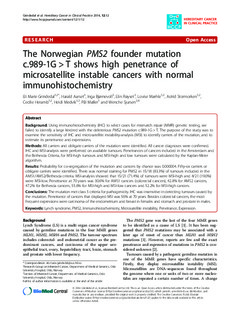| dc.contributor.author | Grindedal, Eli Marie | |
| dc.contributor.author | Aarset, Harald | |
| dc.contributor.author | Bjørnevoll, Inga | |
| dc.contributor.author | Røyset, Elin Synnøve | |
| dc.contributor.author | Mæhle, Lovise Olaug | |
| dc.contributor.author | Stormorken, Astrid T. | |
| dc.contributor.author | Heramb, Cecilie | |
| dc.contributor.author | Medvik, Heidi | |
| dc.contributor.author | Møller, Pål | |
| dc.contributor.author | Sjursen, Wenche | |
| dc.date.accessioned | 2019-11-07T11:02:08Z | |
| dc.date.available | 2019-11-07T11:02:08Z | |
| dc.date.created | 2014-09-01T09:09:59Z | |
| dc.date.issued | 2014 | |
| dc.identifier.issn | 1731-2302 | |
| dc.identifier.uri | http://hdl.handle.net/11250/2627163 | |
| dc.description.abstract | Background
Using immunohistochemistry (IHC) to select cases for mismatch repair (MMR) genetic testing, we failed to identify a large kindred with the deleterious PMS2 mutation c.989-1G > T. The purpose of the study was to examine the sensitivity of IHC and microsatellite instability-analysis (MSI) to identify carriers of the mutation, and to estimate its penetrance and expressions.
Methods
All carriers and obligate carriers of the mutation were identified. All cancer diagnoses were confirmed. IHC and MSI-analysis were performed on available tumours. Penetrances of cancers included in the Amsterdam and the Bethesda Criteria, for MSI-high tumours and MSI-high and low tumours were calculated by the Kaplan-Meier algorithm.
Results
Probability for co-segregation of the mutation and cancers by chance was 0.000004. Fifty-six carriers or obligate carriers were identified. There was normal staining for PMS2 in 15/18 (83.3%) of tumours included in the AMS1/AMS2/Bethesda criteria. MSI-analysis showed that 15/21 (71.4%) of tumours were MSI-high and 4/21 (19.0%) were MSI-low. Penetrance at 70 years was 30.6% for AMS1 cancers (colorectal cancers), 42.8% for AMS2 cancers, 47.2% for Bethesda cancers, 55.6% for MSI-high and MSI-low cancers and 52.2% for MSI-high cancers.
Conclusions
The mutation met class 5 criteria for pathogenicity. IHC was insensitive in detecting tumours caused by the mutation. Penetrance of cancers that displayed MSI was 56% at 70 years. Besides colorectal cancers, the most frequent expressions were carcinoma of the endometrium and breast in females and stomach and prostate in males. | nb_NO |
| dc.language.iso | eng | nb_NO |
| dc.publisher | BMC (part of Springer Nature) | nb_NO |
| dc.rights | Navngivelse 4.0 Internasjonal | * |
| dc.rights.uri | http://creativecommons.org/licenses/by/4.0/deed.no | * |
| dc.title | The Norwegian PMS2 founder mutation c.989-1G>T shows high penetrance of microsatellite instable cancers with normal immunohistochemistry | nb_NO |
| dc.type | Journal article | nb_NO |
| dc.type | Peer reviewed | nb_NO |
| dc.description.version | publishedVersion | nb_NO |
| dc.source.volume | 12 | nb_NO |
| dc.source.journal | Hereditary Cancer in Clinical Practice | nb_NO |
| dc.source.issue | 1 | nb_NO |
| dc.identifier.doi | 10.1186/1897-4287-12-12 | |
| dc.identifier.cristin | 1150625 | |
| dc.description.localcode | © 2014 Grindedal et al.; licensee BioMed Central Ltd. This is an Open Access article distributed under the terms of the Creative Commons Attribution License (http://creativecommons.org/licenses/by/2.0), which permits unrestricted use, distribution, and reproduction in any medium, provided the original work is properly credited. The Creative Commons Public Domain Dedication waiver (http://creativecommons.org/publicdomain/zero/1.0/) applies to the data made available in this article, unless otherwise stated. | nb_NO |
| cristin.unitcode | 1920,14,0,0 | |
| cristin.unitcode | 194,65,15,0 | |
| cristin.unitname | Laboratoriemedisinsk klinikk | |
| cristin.unitname | Institutt for klinisk og molekylær medisin | |
| cristin.ispublished | true | |
| cristin.fulltext | original | |
| cristin.qualitycode | 1 | |

